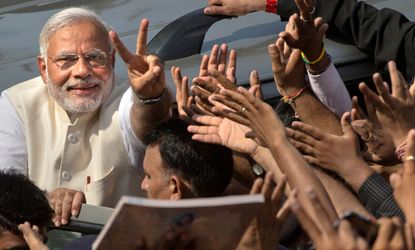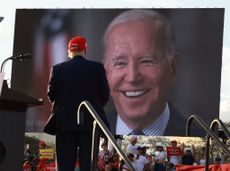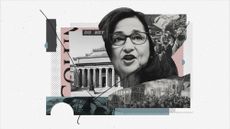Inside India's religious divide
Narendra Modi, a Hindu nationalist, is set to become India's next prime minister. Why is the Muslim minority so worried?

What is Modi's background?
Brash and charismatic, Modi, 63, is the most powerful person in Gujarat state, where he has built a cult of personality. As a young man, he joined the Rashtriya Swayamsevak Sangh (RSS), a Hindu paramilitary group that champions Hindutva — the belief that Hinduism is the true culture of India and should guide its way of life. The group's political wing is the Hindu nationalist Bharatiya Janata Party (BJP). Modi moved from the RSS to the BJP in the 1980s and rose quickly through party ranks. In 2001, the party appointed him chief minister of Gujarat. Since then, the state's economy has boomed, growing at a rate of 10 percent a year, and its people have better access to power and water than ever before. On the strength of those successes, Modi became head of the BJP. Now that the party has cleaned up in the national elections that concluded this week, Modi will become prime minister of the world's second most populous nation. But that prospect alarms many of India's 175 million Muslims.
What do they have against Modi?
Subscribe to The Week
Escape your echo chamber. Get the facts behind the news, plus analysis from multiple perspectives.

Sign up for The Week's Free Newsletters
From our morning news briefing to a weekly Good News Newsletter, get the best of The Week delivered directly to your inbox.
From our morning news briefing to a weekly Good News Newsletter, get the best of The Week delivered directly to your inbox.
He presided over Gujarat in 2002, when Hindu mobs slaughtered 800 Muslims in a pogrom of astonishing brutality. For more than a decade prior to that confrontation, Gujarat's Hindus and Muslims had engaged in a bitter dispute over a 16th-century mosque in the state. BJP leaders said it had been built on the site of the Hindu god Ram's birthplace, and was thus an affront that should be removed. In 1992, tens of thousands of Hindu nationalists descended on the mosque and destroyed it, sparking deadly riots throughout India. In 2002, Hindus were preparing to dedicate a new temple to Ram at the site, when a fight broke out between Hindu activists and Muslims at a train station. During the ensuing riot, a fire later deemed accidental engulfed a train filled with activists, and 59 Hindus burned to death, including women and children. Hindu nationalists believed the burning of the train was a deliberate atrocity, and they took vengeance on the entire Muslim population. Well-organized Hindu mobs slaughtered some 800 people, burned thousands of homes, and destroyed more than 300 mosques. Women were raped and then skewered; even babies were doused with gas and burned alive. In the aftermath, some 150,000 Muslims fled Gujarat.
What was Modi's role?
Official investigations have cleared him of actively supporting the slaughter, but Modi did nothing to stop it — and there's evidence he may have tacitly approved of the violence. Investigations by Human Rights Watch and other outside groups found that the mobs weren't randomly attacking, but rather choosing targets from official lists of Muslim businesses, homes, and mosques. The police refused to respond to Muslim pleas for help, and officers have testified that Modi ordered them directly not to interfere with the mobs. A prominent Muslim politician, Ehsan Jafri, phoned Modi and other officials for help and was told police would come to escort him to safety. Instead, a mob of thousands besieged Jafri's building, hurling firebombs. When he refused to swear allegiance to Ram, they stripped him, cut off his fingers, then his hands, then his feet, and dragged him through the streets, finally killing him.
What happened afterward?
Sign up for Today's Best Articles in your inbox
A free daily email with the biggest news stories of the day – and the best features from TheWeek.com
Modi's popularity soared in Gujarat, as he was seen as having restored Hindu honor and put Muslims in their place. The following year, his party was overwhelmingly re-elected. In later years, Modi's local government tried to block national government investigations into the Gujarat riots, and it has charged officials who cooperate with the inquiry with violating the state's Official Secrets Act. For years, Modi himself refused to discuss the riots. In 2013, as the election campaign began, he made a bizarre apology, tweeting, "I am truly sorry that so many puppies were run over while I was driving the car," later adding, "even though I wasn't really driving; I was in the back seat."
What does Modi say now?
He says India must put 2002 behind it, and as an olive branch to Muslims, the BJP promises to promote Muslim education and restore heritage sites. But Modi's main message is economic, and he says he will do for India's growth and modernization what he did for Gujarat's. He is also presenting himself as a self-made man, in contrast to his main election rival, Rahul Gandhi of the Congress Party, a scion of India's most established and politically connected family. Yet at the same time, Modi has been whipping up sentiment against Muslim immigrants from Bangladesh, saying, "The infiltrators have to go.'' Many Muslims and other religious minorities do not trust Modi's assurances that he will be the leader of all Indians. "Everyone says that Modi is a good leader who built roads and bridges," said Roopa Mody, who witnessed the 2002 massacre in Gujarat. "These roads are built on dead bodies."
India's substantial Muslim minority
India actually has almost as many Muslims as Pakistan. In fact, India's 175 million Muslim citizens give it the world's third-largest Muslim population. Islam first came to the subcontinent in the 8th century with Arab traders, and over the centuries many of its rulers were Muslims. Now, India is about 80 percent Hindu and 13 percent Muslim, with small minorities of Christians, Sikhs, and Buddhists. Muslims make up a majority in the state of Jammu and Kashmir, and they are about a fourth of the population in three other states and a fifth in Uttar Pradesh, a huge state that accounts for about a sixth of the 543 seats in the lower house of Parliament. These Indians do not want to be ruled by the BJP. "It will be difficult for Muslims as well as secular Hindus to forget the 2002 riots," says A. Faizur Rahman of the Islamic Forum for the Promotion of Moderate Thought, "or to absolve Modi of any moral responsibility."
Create an account with the same email registered to your subscription to unlock access.
-
 'Voters know Biden and Trump all too well'
'Voters know Biden and Trump all too well'Instant Opinion Opinion, comment and editorials of the day
By Harold Maass, The Week US Published
-
 Is the Gaza war tearing U.S. campuses apart?
Is the Gaza war tearing U.S. campuses apart?Today's Big Question Protests at Columbia University, other institutions, pit free speech against student safety
By Joel Mathis, The Week US Published
-
 DOJ settles with Nassar victims for $138M
DOJ settles with Nassar victims for $138MSpeed Read The settlement includes 139 sexual abuse victims of the former USA Gymnastics doctor
By Justin Klawans, The Week US Published